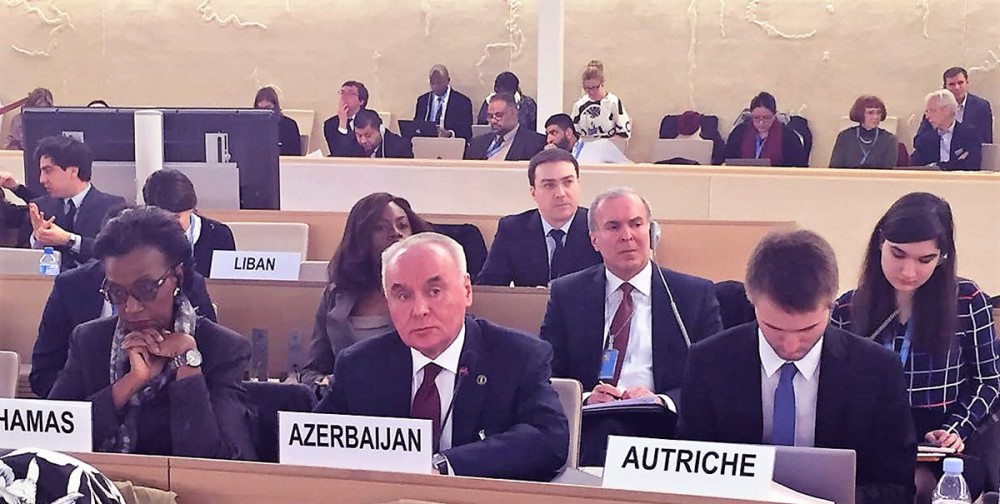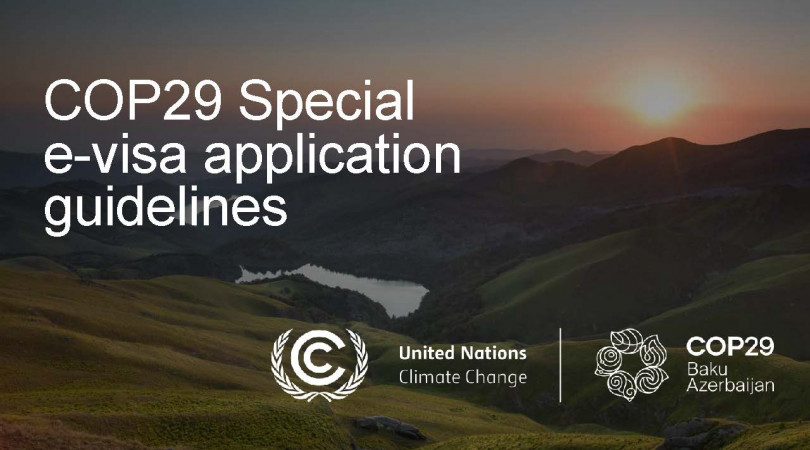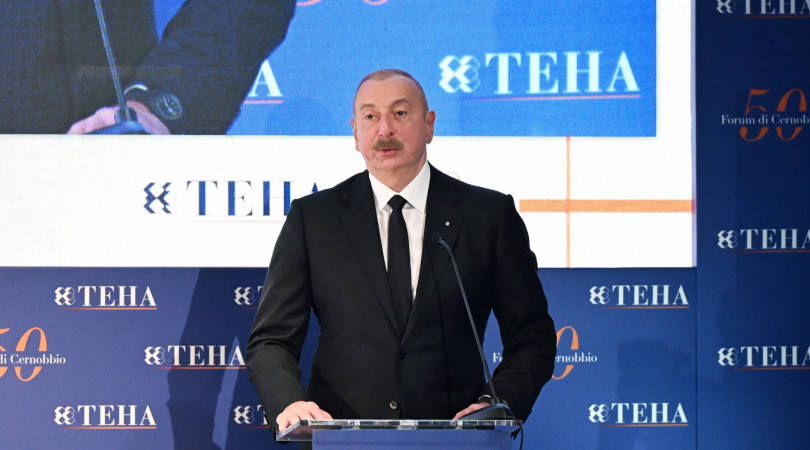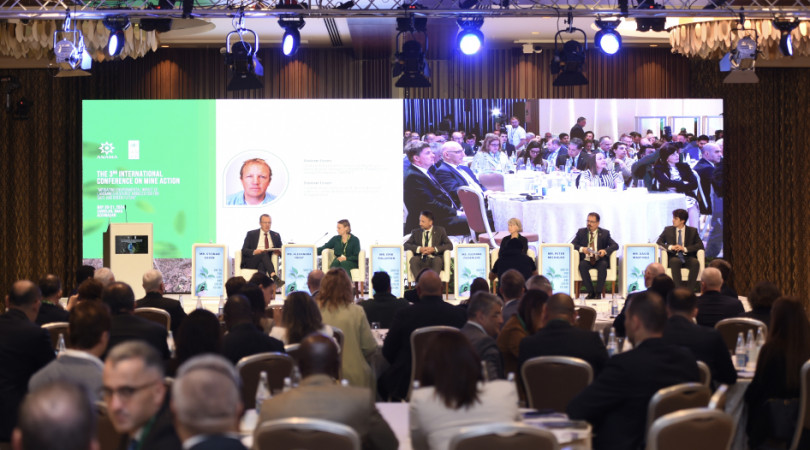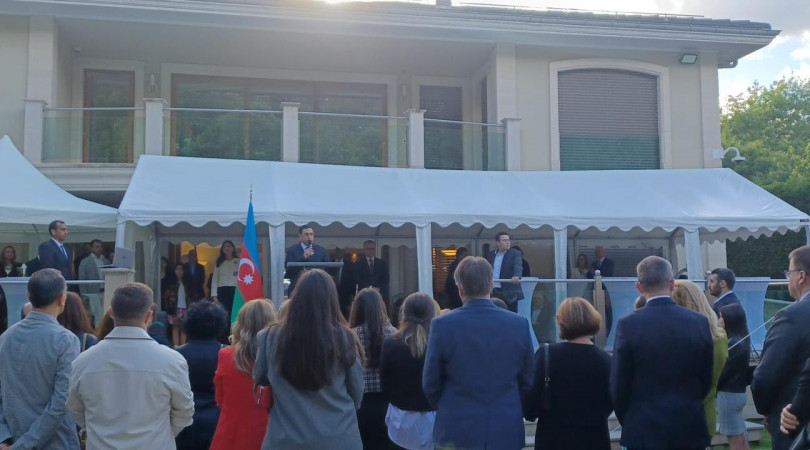Statement by H.E. Mr. Mahmud Mammad-Guliyev, Deputy Minister of Foreign Affairs of the Republic of Azerbaijan at the 34th Session of the UN Human Rights Council - VIDEO
Statement
by H.E. Mr. Mahmud Mammad-Guliyev
Deputy Minister of Foreign Affairs of the Republic of Azerbaijan
at the 34th Session of the UN Human Rights Council
Geneva, 28 February 2017
Dear Mr. President,
Excellencies,
Ladies and gentlemen,
It is a great pleasure and honour for me to be here and to address such an esteemed audience. Taking this opportunity, and on behalf of my Delegation, I would like to welcome all participants of the Session and wish them a constructive and productive discussion.
Allow me to congratulate His Excellency Mr. António Guterres, Secretary-General of the United Nations, who is very well known in my country for his previous activities as the UN High Commissioner for Refugees, and wish him successful fulfillment of the duties ahead. Also my greetings go to Ambassador Joaquin Maza Martelli in his capacity as the President of the UN Human Rights Council, and to Mr. Zeid Ra’ad Al Hussein, the UN High Commissioner for Human Rights.
Dear colleagues,
Let me first briefly inform you about the recent developments in Azerbaijan aimed at further strengthening the protection of human rights, fundamental freedoms, democracy and the rule of law. A new strategy on financing of NGOs envisages facilitation of activities of civil society through improvement of the national donor system laid down in the decree of the President of the Republic of Azerbaijan “On the application of the principle of a “single window” in the procedure of issuing of grants by foreign donors on the territory of Azerbaijan”. In accordance with this decree which entered into force in January 2017, the Cabinet of Ministers approved two decisions on its implementation.
Furthermore, on 10th of February 2017, the President of Azerbaijan signed a decree on “Improvement of operation of penitentiary service, humanization of penal policies and extension of application of alternative sanctions and non-custodial procedural measures of restraint”. The purpose of this document is to improve the functioning and technical basis of penitentiary facilities and to strengthen anti-corruption atmosphere in the penitentiary service. In this regard the Probation Service under the Ministry of Justice will be established.
Also, certain steps have been taken by the Government in line with Azerbaijan's participation in Extractive Industries Transparency Initiative and Open Government Partnership. These measures have included, inter alia, the adoption of the National Action Plan (NAP) on “open government” promotion for next two years, modifications to relevant legislation, establishment of Open Government – Civil Society Platform consisting of 31 NGOs and 9 state authorities, creation of e-platform for monitoring implementation of the above-mentioned Plan.
Azerbaijan is very much interested in continuing the enhanced interaction with the UN Human Rights Council and the Office of the UN High Commissioner for Human Rights. Close cooperation has been pursued also with the UN treaty bodies by regularly submitting reports on measures taken to implement the rights and freedoms stipulated in international instruments.
The UN special procedures mandate holders continued visiting Azerbaijan in the context of a standing invitation of the Government of Azerbaijan, which can be viewed as an example of willingness of my country to constructive cooperation with the UN mechanisms.
The UN Special Rapporteur on the situation of human rights defenders visited Azerbaijan in September 2016 and his report will be presented to this session. In this regard, all requested meetings of the Special Rapporteur with the authorities were organized, and necessary conditions for the Special Rapporteur to meet upon his request with persons in detention were created.
However, the report of the Special Rapporteur on his mission unfortunately failed to reflect the spirit of cooperation between Azerbaijan and the UN human rights mechanisms. We regret that positive developments in the country were not taken into consideration, and this creates a wrong impression on the real situation on the ground. We consider this report as unbalanced and one-sided. The comments of the Azerbaijani side to the report have been presented to the Special Rapporteur, and we expect that these comments will be attached as the Addendum to his report.
Ladies and gentleman,
Despite international efforts, we still observe enormous challenges to full protection of human rights and human dignity. Violations of norms and principles of international law, the ongoing armed conflicts and terrorism accompanied by mass-scale violations of human rights and human losses continue to hamper peace, security and stability worldwide. Unfortunately, this is the case for our region as well.
The continuing armed conflict in and around the Nagorno-Karabakh region of the Republic of Azerbaijan caused by military aggression of Armenia against Azerbaijan based on territorial claims has resulted in the occupation of almost one fifth of the internationally recognized territory of Azerbaijan. By violating basic conventional human rights, Armenia carried out policy of ethnic cleansing against Azerbaijanis living in the occupied territories of Azerbaijan and in Armenia itself, who became refugees and IDPs. As a result of these acts, refugees and IDPs have been deprived of their fundamental right to live at their native lands. Today Azerbaijan hosts in per capita terms one of the highest numbers of refugees and IDPs in the world – 1.2 million.
Besides, it was with profound sorrow that few days ago the people of Azerbaijan commemorated the 25th anniversary of Khojaly genocide. In February 1992, an unprecedented massacre was committed against the Azerbaijani population in the town of Khojaly situated in the Nagorno-Karabakh region of Azerbaijan. As the result of this tragedy, which became known as the Khojaly genocide, more than 600 civilians were killed, including 106 women, 63 children and 70 elderly people, more than 1200 inhabitants were taken hostage, while the fate of 150 persons remains unknown to this day. Unfortunately, those who have committed these atrocities have not yet been brought to justice.
In view of the above-mentioned, we call on the UN Human Rights Council, its special mechanisms and the UN High Commissioner for Human Rights to play an increased role in the restoration of the violated human rights of Azerbaijani IDPs and refugees as reflected in the UN Security Council and General Assembly resolutions on this conflict.
In conclusion, I would like once again to reiterate that Azerbaijan is very much interested in continuing an enhanced dialogue and interaction with the UN human rights mechanisms on the basis of mutual respect and understanding, constructive dialogue, balanced and objective assessments, and expects these mechanisms to express similar attitude free of double standards.
I thank you for your attention.
_____________________________________________________________
/files/file/Statement_by_Mr._Mahmud_Mammad-Guliyev.pdf - the document
https://www.youtube.com/watch?v=Mgsok6JCEeY - VIDEO
